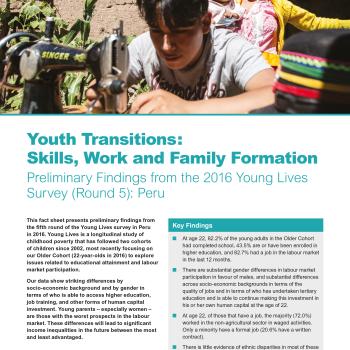
Round 5 Longitudinal Youth Transitions: Skills Work and Family Formation Fact Sheet
This fact sheet presents findings from the fifth round of the Young Lives survey of children in Peru in 2016. Young Lives is a longitudinal study of childhood poverty that has followed two cohorts of children since 2002, most recently focusing on our Older Cohort (22-year-olds in 2016) to explore issues related to educational attainment and labour market participation. Our data show striking differences by socio-economic background and by gender in terms of who is able to access higher education, job training, and other forms of human capital investment. Young parents – especially women – are those with the worst prospects in the labour market. These differences will lead to significant income inequalities in the future between the most and least advantaged.
Key Findings:
At age 22, 82.2% of the young adults in the Older Cohort had completed school, 43.5% are or have been enrolled in higher education, and 82.7% had a job in the labour market in the last 12 months. There are substantial gender differences in labour market participation in favour of males, and substantial differences across socio‑economic backgrounds in terms of the quality of jobs and in terms of who has undertaken tertiary education and is able to continue making this investment in his or her own human capital at the age of 22. At age 22, of those that have a job, the majority (72.0%) worked in the non‑agricultural sector in waged activities. Only a minority have a formal job (20.6% have a written contract). There is little evidence of ethnic disparities in most of these dimensions. At age 22, 42.8% of females have had at least one child and 49.5% are married or cohabiting. By comparison, 17.6% males have a child and 23.3% are married or cohabiting.
Round 5 Longitudinal Youth Transitions: Skills Work and Family Formation Fact Sheet
This fact sheet presents findings from the fifth round of the Young Lives survey of children in Peru in 2016. Young Lives is a longitudinal study of childhood poverty that has followed two cohorts of children since 2002, most recently focusing on our Older Cohort (22-year-olds in 2016) to explore issues related to educational attainment and labour market participation. Our data show striking differences by socio-economic background and by gender in terms of who is able to access higher education, job training, and other forms of human capital investment. Young parents – especially women – are those with the worst prospects in the labour market. These differences will lead to significant income inequalities in the future between the most and least advantaged.
Key Findings:
At age 22, 82.2% of the young adults in the Older Cohort had completed school, 43.5% are or have been enrolled in higher education, and 82.7% had a job in the labour market in the last 12 months. There are substantial gender differences in labour market participation in favour of males, and substantial differences across socio‑economic backgrounds in terms of the quality of jobs and in terms of who has undertaken tertiary education and is able to continue making this investment in his or her own human capital at the age of 22. At age 22, of those that have a job, the majority (72.0%) worked in the non‑agricultural sector in waged activities. Only a minority have a formal job (20.6% have a written contract). There is little evidence of ethnic disparities in most of these dimensions. At age 22, 42.8% of females have had at least one child and 49.5% are married or cohabiting. By comparison, 17.6% males have a child and 23.3% are married or cohabiting.
